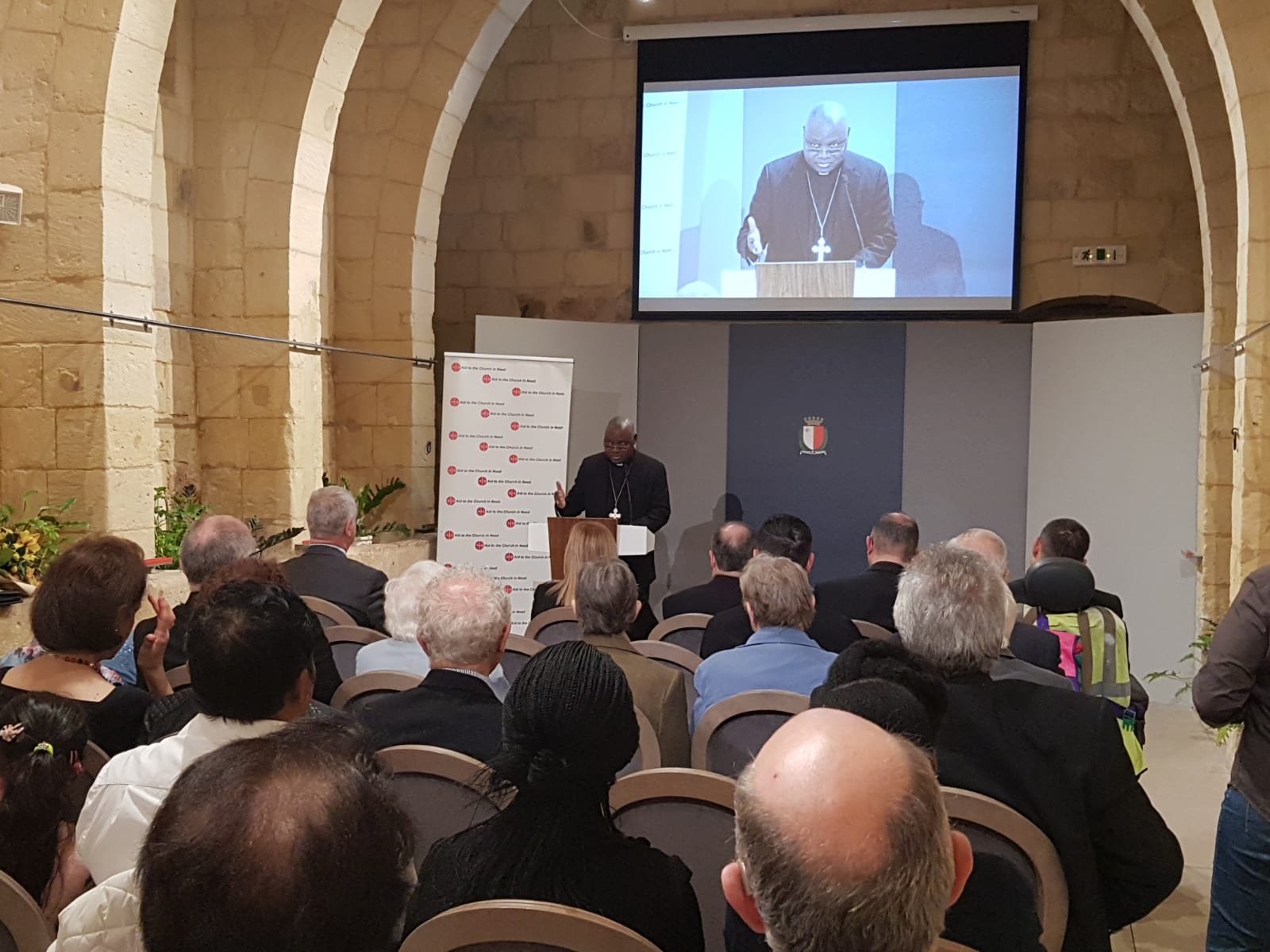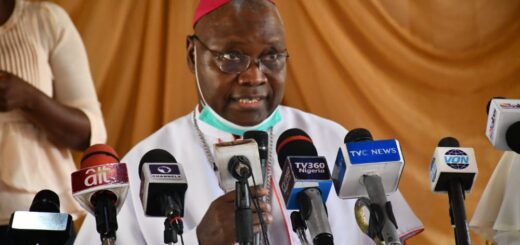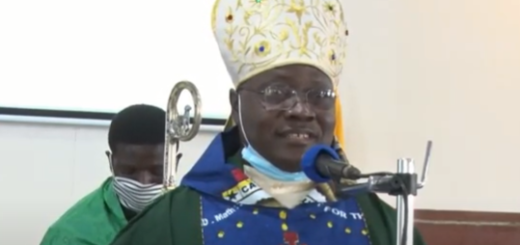Mutual love and unity between the Father, the Son and the Holy Spirit
by ARCH BISHOP · June 12, 2022
Solemnity of the Holy Trinity, Year C, St. Augustine’s Parish, Dutse-Sangbagyi, June 12, 2022. Homily by Archbishop I. A. Kaigama.
Readings: Prov. 8: 22-31; Ps. 8: 4-9; Rm. 5: 1-5; Jn. 16: 12-15
In the name of the Father, and of the Son, and of the Holy Spirit. Amen. May God bless you the 614 candidates to be confirmed, the parishioners of St. Augustine’s Parish, Dutse-Sangbagyi, led by your beloved Parish Priest, Rev. Fr. Cyril Nwafor and strengthen your resolve to love one as a concrete demonstration of the unity of the Trinity. What we emphasize in this Solemnity of the Holy Trinity is the mutual love and unity between the Father, the Son and the Holy Spirit. The lesson for us is how the creative, redemptive and sanctifying functions of the Trinity should influence our lives positively so that God’s love poured into our hearts, will establish bonds of love among us in the image of the Holy Trinity.
Following last Sunday’s unprovoked attack and killings of worshippers at St. Francis Xavier Catholic Church, Owo Local Government Area of Ondo State, one is tempted to ask if the motive was a deliberate attempt to scare us away from worshipping God our way. If that was the aim, my beloved parishioners, I am here to encourage you to remain steadfast in faith and to continue to gather like this in worship irrespective of the series of unprovoked attacks and killings we have suffered over the years. On the 11th March 2012, fourteen people were killed in a bomb attack on Finbarr’s Catholic Church in Rayfield, Jos, Plateau State. The Christmas-day suicide bomb attack in 2011 on St. Theresa’s Catholic Church, Madalla, Niger State followed, killing 39 parishioners. On September 23, 2012, a suicide bomber drove a car into the Church gate of St. John’s Catholic Cathedral, Bauchi, Bauchi State, killing four worshippers and injuring over 40. On 24th April 2018, two Catholic priests and 17 parishioners were killed at St. Ignatius’ Catholic Church during the Holy Mass in Ukpor-Mbalom Parish, Gwer East Local Government Area of Benue State. Several priests have been kidnapped, some killed, and some are still in captivity. Some Rev. Sisters, seminarians, catechists and lay faithful have been kidnapped with some not lucky to survive it. As is common knowledge, some other prominent religious leaders and other Nigerians have suffered a similar fate, yet, very little has been done to identify the culprits or to take solid proactive measures to stop the next attack.
If these persistent attacks on the Catholic Church by those who kill and believe they are offering an excellent service to God (cf. Jn. 16:2) are meant to scare us not to worship again or to speak out in favour of justice, it should be clear that nothing will stop us worshipping God and speaking the truth. Many wonders why the concentration of attacks on the Catholic Church, knowing that the Catholic Church is at the forefront of interreligious dialogue, and is famous for its social services, educational and medical work, etc. It is well known too that the Catholic Secretariat of Nigeria, the organ of administration of the Catholic Bishops Conference of Nigeria has structures such as Justice, Development and Peace departments, concerned with social justice issues, democracy and credible elections. The interreligious department engages Muslims and followers of the African Traditional Religions in dialogue. Many of our priests have studied African Traditional Religion and Islam. The Church established specialized universities in Islam and Arabic studies deliberately to foster interreligious harmony, with the Pope in the forefront.
The relevant government authorities may be unable or unwilling to unmask the unknown gunmen who have earned the diabolic distinction of murdering innocent people without qualms, but God knows about it. That God has not punished them instantly does not mean He does not know who they are or where they are. We, on our part refuse to retaliate not because we are cowards or we don’t know how to use destructive weapons; but because we see the evil attackers as children of God in need of salvation. It is not conceivable that without provocation, defenceless people worshipping their God on a Pentecost Sunday, not wielding guns other than the weapon of prayer could be gunned down. It is more disheartening that there is no immediate verifiable security evidence of who the attackers are and this continues to happen, with increasing frequency to the extent that people are no longer able to feel safe in places of worship, at home, on the streets, in the farms, at markets and schools; yet, all that our leaders care about now is guaranteeing their political future, and oblivious of the rude happenings, they go on to spend incredible amounts in both local and foreign currencies to get elected!
We should be joyfully celebrating democracy Day today, 12th June, but how can we when corruption seems to be institutionalized in a manner that it is okay to spend humongous amounts of money to influence voters and still believe that if such people are elected to political power they will provide transparent governance with honest economic policies.
How do we celebrate in the midst of escalating prices of essential commodities, hunger and unemployment? How do we celebrate democracy when yet-to-be-identified gunmen pose such a grievous setback in our march towards harmonious and peaceful co-existence? How do we celebrate when corrupt governance and insecurity threaten the present and future of Nigerians?
The Solemnity of the Most Holy Trinity should inspire us to respect our individuality; to be bonded in love and communion through reciprocal self-giving, holding nothing back. Unfortunately, our country seems to be driven by ideologies and interests that only favour a given few.
We pray that someday, we may truly become “one nation bound in freedom, peace and unity,” when Christians, Muslims and Traditional religious worshippers will come together to unmask marauders living among us, now emboldened by the poor action of the government and the relevant security agencies.
Mother Theresa says, “If we have no peace, it is because we have forgotten that we belong to each other.’’ May we learn to sincerely belong to one another.




